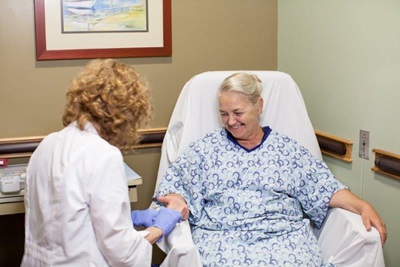Understanding Genetic Risk
Who is at risk for breast cancer?
All women are at risk for breast cancer. While men also get the disease, it is about 100 times more common in women than in men. A woman's risk of breast cancer also increases as she gets older.
Women with a family history of breast or ovarian cancer are also at a higher risk of developing the disease. The more blood relatives you have with breast or ovarian cancer, the stronger your family history and the greater your risk.
Sometimes a very strong family history is caused by a mutated gene that runs in the family. While the majority of breast cancers are not caused by inherited risk, research has shown that about seven percent of breast cancer cases are hereditary.
How is this risk inherited?
We're all born with two copies of about 30,000 different genes, one copy of each gene from our mother and one copy from our father. Two genes in particular, BRCA1 and BRCA2, normally work to prevent breast cancer. But in some cases, we can inherit a BRCA1 or BRCA2 alteration from either parent. This alteration or mutation interferes with the normal activity of the gene, making us more susceptible to breast cancer.
How do I know if I have inherited an altered gene?
The only way to find out if you have inherited an altered BRCA1 or BRCA2 gene is to have a breast cancer gene test. The most common breast cancer gene test is the BRACAnalysis®. By analyzing a sample of your blood, laboratory technicians can determine any mutations in the BRAC1 and BRAC2 genes. A mutated gene indicates a genetic predisposition to hereditary breast cancer.
It is important to note that the presence of a BRAC1 or BRAC2 gene mutation is NOT a breast cancer diagnosis nor does it mean that a breast cancer diagnosis is inevitable.
If I have an altered gene, what are my options?
Identifying your inherited risk can help you and your doctor make the most informed decisions about your future health care. For example, a woman who knows she carries a BRCA mutation may start breast cancer screening at an earlier age. She may also choose to take risk-reducing medications or have preventive surgery.
For more information on genetic testing for inherited cancer risk, talk to your doctor.

Genetic Counseling
BayCare now offers genetic counseling. The goal of genetic counseling is to provide patients with information about hereditary cancer risk and guidelines for cancer screening and treatment.


